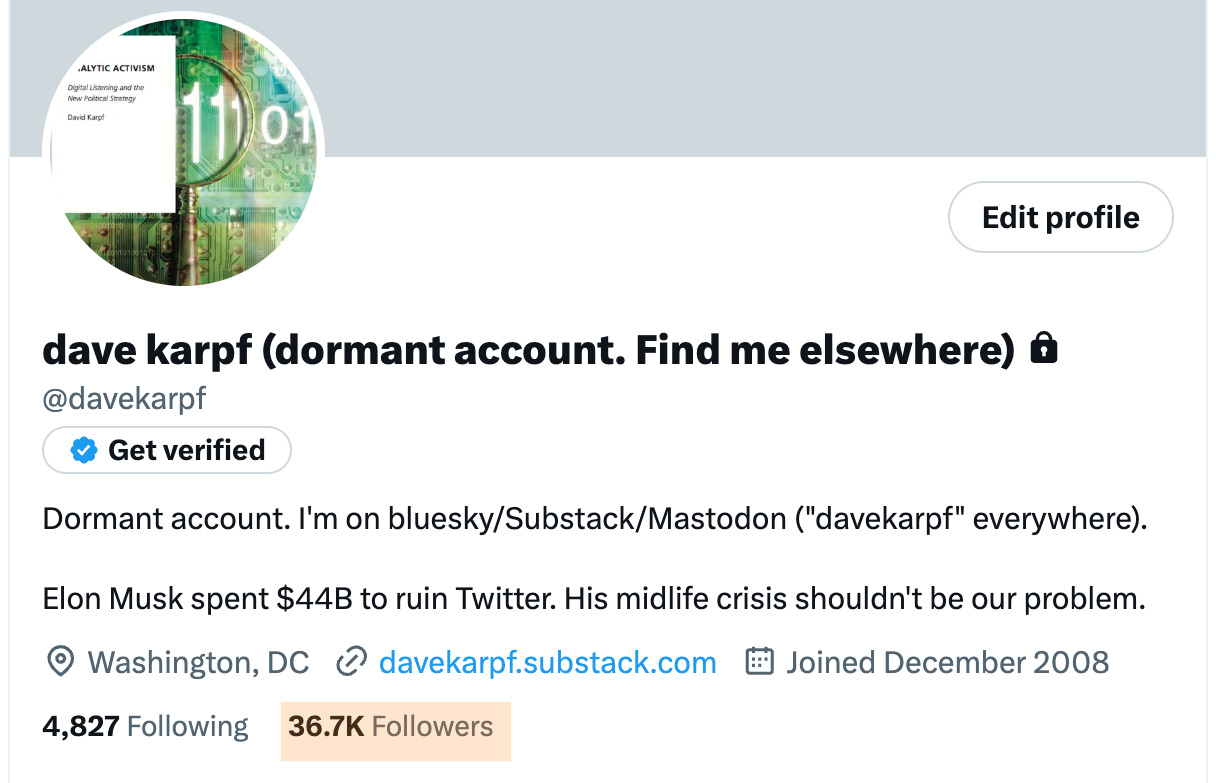I’ve been thinking recently about the Ship of Theseus.
If you replace every part of a complex machine, at what point does it stop being the same machine?
If you took all those old parts and reassembled them elsewhere, do you eventually reach a point where the reassembled alternative becomes, in essence, the real thing?
Elon Musk’s X is no longer Twitter. Piece by piece, part by part, Twitter has decomposed.
Its essential pieces have been reassembled elsewhere though, give or take a few. Bluesky is, effectively at this point, the new Twitter.
The pieces that are still missing are the ones that were better off discarded anyway
I joined Bluesky in May 2023. I was the 57,243rd user.
I know this because, after the site registered its 10 millionth user, they sent out little digital placards, celebrating your user number. That was in September 2024. Last week it crossed 15 million. Right now it’s over 18.8 million. That’s some serious growth. I’m not sure whether Elon turning X into a full-time conservative propaganda network swayed many votes in the election, but it absolutely convinced a big chunk of the user base that it was finally time to get the hell out of there.
The first thing to know about the site is that it began as a project of Twitter, back in the Jack Dorsey era. Dorsey read Mike Masnick’s “Protocols, not Platforms” essay and became convinced that Twitter would be better as an open protocol, rather than a publicly traded company. It was spun off prior to the sale to Musk, and is run by a small team of developers. So it feels a lot like old-Twitter, because that’s what it was designed for.
(Dorsey is no longer involved with the project — he no longer has a board seat, or even a Bluesky account. Masnick now sits on Bluesky’s board.)
The second thing to know is that it was populated from the start by fed up Twitter power-users. The culture of the site feels a lot like Twitter in the early days, because the community built up around people who were good at tweeting but would like fewer death threats, pleaseandthankyou.
The most important difference between Bluesky and X (or Threads, for that matter) is the limited use of algorithmic sorting. X uses a lot of machine learning to determine what content you ought to see — either because they think you’ll engage with it, or because advertisers are paying to promote it, or because it’s part of Elon’s shitty political agenda. Bluesky has a “Discover” feed, that shows you recent popular posts, but your main feed is just a reverse-chronological list of posts from people-you-follow. You can also subscribe to specialized feeds that other users set up, or set one up yourself.
To get started on Bluesky, you can either use a migration tool that will search for accounts on Bluesky that you already followed on Twitter/X, or you can make use of “Starter Packs.” Starter Packs are individually-curated lists of good accounts that anyone can set up.
Also, Bluesky has no trending topics. This all gives it a very human-centered, people-just-talking-to-people feel. …Like Twitter, a decade ago, before they started trying to juice engagement with a thousand different tricks.
Another key difference is the nuclear block. When you block someone on Bluesky, it short-circuits the conversation thread. Readers just see a notice that the post was from a blocked account. Similarly, if someone tries to dunk on you through the quote-tweet function, you can select “detach quote,” and your post will no longer appear.
The stronger blocking functionality short-circuits some of the worst genres of Twitter outrage-mining. Consider conservative provocateurs like Matt Walsh, Ben Shapiro, and LibsofTikTok. Their bread and butter, for years, has been to pick bad-faith fights with online progressives, drawing attention and enhancing their stature. They use the quote-retweet function has been a great tool for them in building audiences and driving hostile engagement. On Bluesky, it’s much harder for them to summon a harassment brigade. (They can get around it by posting a screenshot, but that still adds friction into the system.)
There’s also little upside in mining outrage, because there’s no master algorithm to game. No trending topics means no cryptocurrency bot armies, trying to get some memecoin to trend. It means MAGA conservatives can’t generate significant extra exposure by picking fights with liberals, boosting their algorithmic visibility.
If we’re looking solely at engagement metrics, this is a mistake from Bluesky. The site will never have the raw traffic numbers of peak-Twitter if it eliminates the structural incentives for engagement-farming bullshit. Crypto shills and hustle-culture types might never establish themselves on Bluesky — not because its a liberal “echo chamber,” but because none of their tactics work. (Good luck promoting your new NFT rug pull when you can’t even get a good fight going with the normies.) It also means some of the memorable “main character” moments of Twitter’s post might never happen here. (“Slurp juice” could never have happened on Bluesky. Alas…)
But, ultimately, those missing features of old-Twitter were also pretty corrosive to the user experience. Growth-above-all-else came with a tradeoff, and tradeoff was everything else. You probably will never check in to Bluesky to find out who were all mad at today. But that’s also probably a good thing.
Some in the pundit-class are currently complaining that Bluesky is an “echo chamber.” The site is overwhelmingly populated by people who couldn’t put up with the white nationalist conversation that dominates X now. Those who ideologically agree with Elon Musk’s political agenda aren’t going anywhere en masse.
It seems… decidedly odd to me that anyone would treat this as Bluesky’s problem rather than Elon’s problem. One of these websites is hemorrhaging users while trying to make enough money off of digital advertising and bluechecks to pay the $1.2 billion in annual debt payments. The other website runs on open source code. It has no advertising, no debt payments, and vague plans to add a subscription tier sometime in the future to cover costs.
I’m not sure what Bluesky’s business model will eventually be. It has taken on some venture capital funding, and those funders will want some sort of profitable exit at some point. But the Bluesky team isn’t falling into any of the old growth-hacking traps that so much of Silicon Valley adores these days. The site is winning because the user base loves it and evangelizes it. So long as they don’t start chasing runaway dreams of endless blitzscales, it is entirely possible that we can have nice things online. (Just this once. As a treat.)
I understand there are still some big accounts that are reticent to leave Elon’s X. But I suspect they are confusing fake metrics for real community. Bluesky is already large enough to replace what they’ve lost.
Incidentally, it was two years ago today, just after Elon’s Twitter takeover, that Nancy Scola’s Politico article was published, witha quote from me as the title: “I Caught Lightning in a Bottle. I Will Be One of the Last People to Leave Twitter.”
Newer readers of this blog might be unaware of the backstory. In August 2019, I got into, uh, a bit of an online spat with NY Times columnist Bret Stephens. (I called him a metaphorical bedbug, he emailed my provost, it was a whole thing.) Bret became the Internet’s main character for about a week. The whole damn internet took my side. And that brief episode of Twitter-fame left me with around 40,000 Twitter followers. I wasn’t actually famous, but you could definitely say I was Twitter-famous.
Call it “Big Account Syndrome.” I had lucked into a much larger audience on Twitter than I could expect to find anywhere else. So I imagined I would be stuck riding it out. (How bad could it really get, right?)
A couple months later, I noticed that those readership numbers were hollow. I still had over 40,000 Twitter followers, but only 5-7% of them were even exposed to my tweets. Either I was in algorithm-jail or the people who followed me weren’t logging in so much anymore.
And then I joined Bluesky. And I was immediately a fan. It felt like Twitter, without all the things that were ruining Twitter. By September 2023, I decided the phantom-reach wasn’t worth the effort anymore. Burn it down; time to start anew.
Anyway, here’s the kicker: I deleted my account on Thursday. (Fuck Elon and his new Terms of Service.). Due to attrition, my final follower count was 36,700.
Meanwhile, Bluesky has been buzzing. I’m in some cool starter packs, and the Twitter exodus (X-odus?) seems to be full of the old remnants of my crowd. Here’s my account today:
So much for Big Account Syndrome. Bluesky at ~20 million has more actual engagement than X at ~200 million.
The ship of Theseus has been rebuilt. The company that Elon bought wasn’t so irreplaceable after all. Seventeen years of network effects should, in theory, have been an insurmountable advantage. But network effects and habitual user behavior have proven no match for the strongest repulsive forces in the known universe:
Elon Musk’s personality.







I never knew you were twitter famous, or that you'd peed on Bret Stephens' foot & pissed him off! But good show, old bean! I became aware of your existence thanks to your long post, supported by both data and anecdote, on the topic of Substack Nazis Considered Harmful.
New topic: it's been a crazy 6 weeks chez moi, but things have calmed down a bit and I expect to post that conversation you & I had before the election to my forthcoming podcast before the first of December.
The recent influx of crypto investment in BlueSky has be concerned for its future. Meantime, though I get a lot less engagement, I'm remaining on Mastodon. I hope we can have nice things online, and that X continues its descent into irrelevance.